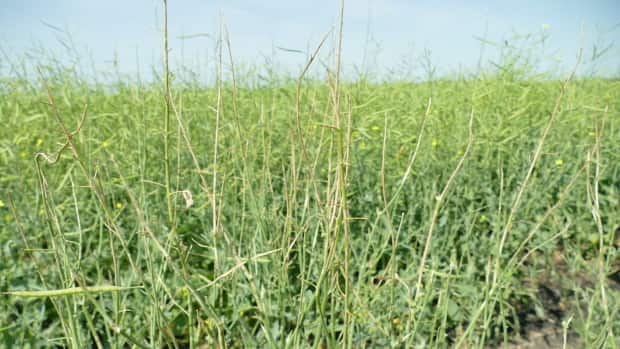Crop-destroying grasshoppers chewing away at Manitoba farmers' livelihoods

For a fourth year in a row, Manitoba's grasshopper population is on the rise and causing more issues for farmers already struggling to make it through drought conditions.
The insects, with around 85 species of in Manitoba, thrive in hot, dry conditions. They feed off green grasses and cereal, pulse and oilseed crops.
They're also known to chew into other crops if feed isn't readily available.
"Some areas have very high numbers and they're struggling to get control done. Other areas, it's not as dire. So it's a variable situation," said entomologist John Gavloski of Manitoba Agriculture.
"I would say the Interlake is probably one of the areas where I've heard of some of the most damage from grasshoppers because of the combination of crops that are not growing well and high grasshopper levels."
Grasshopper surveys around since 1931
Gavloski said grasshopper counts have been rising steadily since 2017. Detailed surveys have been done in Manitoba each August since 1931. Gavloski and his staff are preparing to do the 2021 count this month.
Forecasts are based on physical counts alongside fields, as well as weather conditions and recent trends.
"If anything, our grasshopper forecast underrepresented what actually showed up, which is not totally unexpected because the forecast is nothing but a forecast," he said. "You can't not be scouting or looking because the forecast said low in my area, and I try to qualify that too.
These farmers put everything into it. This is their livelihood, and everything that happens just slowly takes the top off.
- Kevin Thompson, agronomist and farmer
"There's a lot that can affect what really happens now."
This summer, according to Manitoba Agriculture, just five per cent of wheat and canola crops in the Interlake region are rated as good quality. In the western part of the province, about half of crops are rated as good.
Farmers in 'constant battle'
Kevin Thompson farms with his family near Dauphin in western Manitoba, about 250 kilometres northwest of Winnipeg.
Also an agronomist with 360 Ag Consulting, he said his area has also been dealing with more grasshoppers than usual this year.
"It's been a constant battle," Thompson said, during an interview alongside a field in the area last week. "This field behind us I still think is worth saving."

Thompson said some fields in the region have been sprayed for grasshoppers multiple times, but insects are still chewing away at fields, the latest threat to drought-stricken farmers.
"It's been challenging, I guess would be a good way to put it," he said. "With the late frost in the spring and heat, bugs. It's been the whole gamut. Wind, hail just recently. We've seen it all."
Fifteen municipalities in Manitoba have declared agricultural states of disaster because of challenging growing conditions. Harvesting is underway in some areas, with some fields maturing weeks earlier than normal because of the drought.
Thompson expects some of his fields can still net about half of a normal year's yield, and considers himself lucky.
"These farmers put everything into it," said Thompson. "This is their livelihood, and everything that happens just slowly takes the top off."
All solutions point to rain
Gavloski said the grasshopper population can be knocked down with some steady rain, which Manitoba hasn't seen for some time.
"Grasshoppers, they do much better under hot, dry conditions," he said. "And if it's hot, they start laying eggs earlier. If they get hot, dry throughout the summer, they will be closer to their maximum number of eggs."
Thompson said producers will try to salvage what they can despite the challenges.

"I have been here through the wet years and those have been struggles. But this year, the amount of threats and the variety of threats has been has been definitely new to me."

 Yahoo Movies
Yahoo Movies 